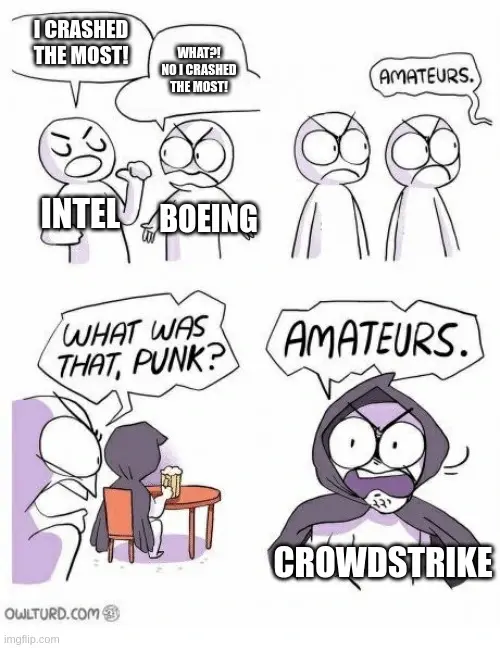this post was submitted on 25 Jul 2024
605 points (96.0% liked)
linuxmemes
20723 readers
1421 users here now
I use Arch btw
Sister communities:
- LemmyMemes: Memes
- LemmyShitpost: Anything and everything goes.
- RISA: Star Trek memes and shitposts
Community rules
- Follow the site-wide rules and code of conduct
- Be civil
- Post Linux-related content
- No recent reposts
Please report posts and comments that break these rules!
founded 1 year ago
MODERATORS
you are viewing a single comment's thread
view the rest of the comments
view the rest of the comments

Oxidation in the fab process. They have simultaneously claimed that oxidation isn't causing any issues, and that it's caused only "some" crashing issues. Because they've been so wishy washy, it's probably safe to assume that any 13th or 14th gen CPU that experiences any kind of crash or BSOD is degraded and should be RMA'ed immediately, otherwise you risk getting stuck with a permanently physically degraded CPU.
Intel says they identified the issue sometime in 2023 and fixed the fab process. So the good news is that any newly manufactured Raptor Lake CPU shouldn't have this issue. The bad news is that Intel won't give a date range of when the fab issue occurred, or exactly what CPUs it affected (by date code), so really the only choice consumers have at this point (before we get to the inevitable class action lawsuit) is to RMA at the slightest sign of instability.
Intel is also planning to release a microcode update in August, but there's a lot of doubt that this can be fixed via microcode.
This was affecting 50% of Raptor Lake CPUs in data centers, and it's become clear via video game telemetry that it has also affected a significant number of consumer chips.
https://youtu.be/OVdmK1UGzGs